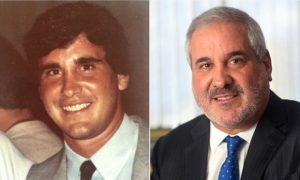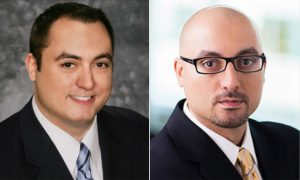In a Hot Lateral Market, Why Are Some Lawyers Lifers?
More attorneys than ever are ready to change firms, but loyalty and satisfaction keep some eyes from wandering.
April 02, 2019 at 03:57 PM
6 minute read
The original version of this story was published on Daily Business Review

In today's hot lateral legal market, attorneys who have spent their entire career at one law firm are no longer the norm.
There were nearly 9,000 lateral partner moves within the Am Law 200 in the five-year span from 2014 through 2018, bringing an estimated $17.1 billion in total business with them. For perspective, revenue at Am Law 200 firms grew by $16.9 billion over that same time frame.
Amid the madness, attorneys who stay with one firm for their entire career can still be found. So why do these so-called “lifers” stay, and what do they think of today's lateral market? Although each of the following lawyers works at a different firm, they gave similar answers, citing loyalty, mentorship and personal and professional fulfillment.
 Steven Weinstein in 1991 and now
Steven Weinstein in 1991 and nowSteven Weinstein — Managing Partner of K&L Gates' Miami Office — 26 years at the firm (since 1993)
Weinstein has a simple answer for why he has been with K&L Gates for almost 30 years:
If it ain't broke, don't fix it.
“I never really made a conscious decision to stay,” he said. “I always try to appreciate the good I have.”
He relishes stability, he said, and the work-life balance K&L Gates allowed him. Weinstein said he was “exceptionally” involved in his twin sons' activities—he even coached their sports teams. And he genuinely enjoys coming into work each day, a sentiment shared by other lifers.
Weinstein said mentorship also played a huge factor, rattling off the names of important mentors he had in his legal career and K&L Gates attorneys who helped him develop into a leader at the firm, including former K&L partners Dan Casey, Gregg Breitbart and Dennis Nowak.
As for why today's lateral market is so hot, Weinstein has a few guesses but no definitive theories. One possible reason is generational, he said. From his personal experience with his sons, young attorneys have a different attitude about what satisfies them professionally. It's not just about money anymore.
But competition has gotten stiffer as Big Law firms have come pouring into the Sunshine State. Since 2003, the number of Am Law 200 firms with a Florida presence has nearly doubled.
With Big Law competition comes big guarantees on salaries and big titles, Weinstein said.
“If it's primarily a monetary decision, I can see why some people might leave,” he said.
 Jennifer Olmedo-Rodriguez in August 2001 and now
Jennifer Olmedo-Rodriguez in August 2001 and nowJennifer Olmedo-Rodriguez — Managing Partner of Buchanan Ingersoll & Rooney's Miami Office — 16 years at the firm (since 2003)
Olmedo-Rodriguez said that at her core, she's a loyal person: She has had the same hairdresser since she was 9 years old.
But loyalty is earned, and Buchanan has surely earned hers, she said.
Not only did they allow her to defer her job offer so she could take a judicial clerkship, they kept the offer on the table even as the events of Sept. 11 led to her law school colleagues having their job offers revoked. When she started, the firm got her immediately involved, bringing her to hearings and depositions instead of “locking her in a back room to bill hours.”
And, when she left for three years to take care of her first child—working from home in the interim doing regulatory work in Spanish—the firm welcomed her back “with open arms.”
“They put me back into my class year, kept me on that track,” she said. “Even the code to get into the office and my computer was the same. … It was like I never left.”
 Steven Marks as a Podhurst Orseck associate and now
Steven Marks as a Podhurst Orseck associate and nowSteven Marks — Senior Partner at Podhurst Orseck — 34 years at the firm (since 1985)
Marks is unique among this group in that his “lifer” status at Podhurst is the norm, not the exception.
A boutique litigation firm, Podhurst is unusual in that the firm very rarely brings in laterals, preferring to hire associates straight out of school and bring them up through the ranks.
The firm has done one major partner lateral hire in the three decades since Marks started, he said—when Holland & Knight's litigation chairman, Peter Prieto, came over in 2010. Marks, who handled the hire, asked for the approval of the entire office before bringing Prieto on board.
“I don't know if we'd ever do it again,” Marks said. “We're the antithesis of laterals. We don't bring partners in over other people. We made sure everybody junior to Peter was OK with it.”
Regarding the hot lateral market, Marks also pointed to the increase in competition. As law firms, especially larger ones, are pushed by clients to become full-service, it leaves “everybody fighting for the same pot.” Partner laterals are a quick way to shore up practice areas.
“In order to keep that client, they have to be able to serve all of their needs,” he said.
 Associate Joe Rich in 2002 and now
Associate Joe Rich in 2002 and nowJoseph Rich — Managing Partner at Cozen O'Connor's Miami office — 15 years at the firm (since 2004)
Like Weinstein, Rich attributed his long career at Cozen to the work-life balance.
“I don't feel like I'm ever missing out on family time,” Rich said. “I have a lot of friends that are attorneys, and they can't say the same thing.”
Rich was also given multiple senior mentors in a variety of areas, from writing to socializing. He was also fully supported in all of his business development ventures, he said, adding that support of that kind isn't a given and is a big reason why people leave their firms.
“A lot of people took a vested interest in my development, and I don't feel like that's common in similar firms of our size,” he said.
Similar Stories:
It's Time to Overhaul the Lateral Hiring Process
Data Snapshot: A Rising Tide of Competition in Florida's Legal Market
This content has been archived. It is available through our partners, LexisNexis® and Bloomberg Law.
To view this content, please continue to their sites.
Not a Lexis Subscriber?
Subscribe Now
Not a Bloomberg Law Subscriber?
Subscribe Now
NOT FOR REPRINT
© 2025 ALM Global, LLC, All Rights Reserved. Request academic re-use from www.copyright.com. All other uses, submit a request to [email protected]. For more information visit Asset & Logo Licensing.
You Might Like
View All
Greenberg Traurig Litigation Co-Chair Returning After Three Years as US Attorney
3 minute read
Blank Rome Snags Two Labor and Employment Partners From Stevens & Lee
4 minute read
12-Partner Team 'Surprises' Atlanta Firm’s Leaders With Exit to Launch New Reed Smith Office
4 minute read
After Breakaway From FisherBroyles, Pierson Ferdinand Bills $75M in First Year
5 minute readTrending Stories
- 1South Florida Attorney Charged With Aggravated Battery After Incident in Prime Rib Line
- 2'A Death Sentence for TikTok'?: Litigators and Experts Weigh Impact of Potential Ban on Creators and Data Privacy
- 3Bribery Case Against Former Lt. Gov. Brian Benjamin Is Dropped
- 4‘Extremely Disturbing’: AI Firms Face Class Action by ‘Taskers’ Exposed to Traumatic Content
- 5State Appeals Court Revives BraunHagey Lawsuit Alleging $4.2M Unlawful Wire to China
Who Got The Work
J. Brugh Lower of Gibbons has entered an appearance for industrial equipment supplier Devco Corporation in a pending trademark infringement lawsuit. The suit, accusing the defendant of selling knock-off Graco products, was filed Dec. 18 in New Jersey District Court by Rivkin Radler on behalf of Graco Inc. and Graco Minnesota. The case, assigned to U.S. District Judge Zahid N. Quraishi, is 3:24-cv-11294, Graco Inc. et al v. Devco Corporation.
Who Got The Work
Rebecca Maller-Stein and Kent A. Yalowitz of Arnold & Porter Kaye Scholer have entered their appearances for Hanaco Venture Capital and its executives, Lior Prosor and David Frankel, in a pending securities lawsuit. The action, filed on Dec. 24 in New York Southern District Court by Zell, Aron & Co. on behalf of Goldeneye Advisors, accuses the defendants of negligently and fraudulently managing the plaintiff's $1 million investment. The case, assigned to U.S. District Judge Vernon S. Broderick, is 1:24-cv-09918, Goldeneye Advisors, LLC v. Hanaco Venture Capital, Ltd. et al.
Who Got The Work
Attorneys from A&O Shearman has stepped in as defense counsel for Toronto-Dominion Bank and other defendants in a pending securities class action. The suit, filed Dec. 11 in New York Southern District Court by Bleichmar Fonti & Auld, accuses the defendants of concealing the bank's 'pervasive' deficiencies in regards to its compliance with the Bank Secrecy Act and the quality of its anti-money laundering controls. The case, assigned to U.S. District Judge Arun Subramanian, is 1:24-cv-09445, Gonzalez v. The Toronto-Dominion Bank et al.
Who Got The Work
Crown Castle International, a Pennsylvania company providing shared communications infrastructure, has turned to Luke D. Wolf of Gordon Rees Scully Mansukhani to fend off a pending breach-of-contract lawsuit. The court action, filed Nov. 25 in Michigan Eastern District Court by Hooper Hathaway PC on behalf of The Town Residences LLC, accuses Crown Castle of failing to transfer approximately $30,000 in utility payments from T-Mobile in breach of a roof-top lease and assignment agreement. The case, assigned to U.S. District Judge Susan K. Declercq, is 2:24-cv-13131, The Town Residences LLC v. T-Mobile US, Inc. et al.
Who Got The Work
Wilfred P. Coronato and Daniel M. Schwartz of McCarter & English have stepped in as defense counsel to Electrolux Home Products Inc. in a pending product liability lawsuit. The court action, filed Nov. 26 in New York Eastern District Court by Poulos Lopiccolo PC and Nagel Rice LLP on behalf of David Stern, alleges that the defendant's refrigerators’ drawers and shelving repeatedly break and fall apart within months after purchase. The case, assigned to U.S. District Judge Joan M. Azrack, is 2:24-cv-08204, Stern v. Electrolux Home Products, Inc.
Featured Firms
Law Offices of Gary Martin Hays & Associates, P.C.
(470) 294-1674
Law Offices of Mark E. Salomone
(857) 444-6468
Smith & Hassler
(713) 739-1250









